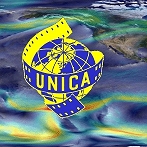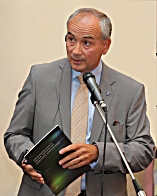
UNICA 2015
Report on the activities of IFTC (UNESCO)

Serge Michel
34 Rue des Coucous
FRA-44230
Saint Sebastien sur Loire
+33 2 40342077
+33 2 40359269
serge.michel@rff.fr
Dear delegates, ladies and gentlemen, dear friends,
The year 2014-2015 was marked by the realization of the project
aiming to collect in a "DVD collection" all the films which have
been awarded the UNESCO-IFTC Fellini medal in the last fifteen UNICA
competitions (1999-2013) – a medal awarded annually to a film
promoting the values of tolerance and peace upheld by UNESCO.
The first version of the case composed of 3 DVDs was produced just before the UNICA 2014 Congress in Piest'any, could thus be offered to all delegates attending the General assembly. A new version in an enhanced "packaging" was then produced for distribution to the members attending the General conference of UNESCO. This new version can also be used by UNICA and made available to the Friends of UNICA. This DVD is a remarkable illustration of the the wide range and richness of the prize winners, as well as an opportunity to enhance the activities of UNICA and IFTC.
The 2014 International UNESCO-IFTC Delmiro de CARALT Prize was awarded to Simon Szabo, the Hungarian author of the film The Wall in the UNICA competition in Piest'any. A Fellini medal will again be made available for the jury to award it as the UNESCO – IFTC International Prize on the occasion of the 2015 UNICA Competition in Saint Petersburg. A short reminder: the medal was engraved for the first time in 1995 and presented at the Cannes festival in 1995, two years after the death of Federico Fellini on 31 October 1993.
On 18 February 2015 Georges Dupont, Director General of IFTC and myself, together with Vyacheslav Zaytsev had a meeting in Paris with representatives of the Permanent Delegation of the Russian Federation to UNESCO. We had a warm welcome and the opportunity to have a bilateral exchange of views with a view to facilitating the preparation of the St Petersburg Congress and obtain additional support for our Russian friends. As was done in 2012 at the Rusé Congress, a message prepared by Mrs Irina Bokova, Director-General of UNESCO, should again be delivered this year at the UNICA Congress in Saint Petersburg.
Another highlight of our cooperation with IFTC was the visit paid on 09 May 2015 to Algiers for the commemoration of the fiftieth anniversary of the National Algerian Film Library. This institution was created just after Algeria gained independence and has developed in the 60s-70s to one of the most active film libraries worldwide. Following the invitation of the Algerian Minister of Culture, a delegation composed of Georges Dupont, IFTC Director General, Daniel Van Espen (SIGNIS) and myself as vice-presidents, and also Jean-Michel Arnold not only as vice president of IFTC (CAMERA), but also as a pioneer of the Film Library in Algiers where he was in charge of programming in the 1964-1969 period. Mrs Valentine Roulet, head of the department for creation of the CNC (Centre National français du Cinéma et de l’image animée) and daughter of François Roulet, a decorator and poster artist who was active there in the early years of the Library cinema and whose work is preserved at the Museum of Fine Arts in La-Chaux-de-Fonds, Switzerland (François Roulet was a native of Le Locle, Switzerland), was also part of the delegation, together with Mr. Bernard Andrieux, the director of several filmed biographies and – more recently – the author of a collection of films dedicated to the Algerian war, and Robert Silman, the British creator of Wonderland Stream, an Internet website and platform for exchange and assessment of short films.
With Mr. Ahmed Bedjaoui - the general curator of the exhibition, also working at the Algiers Film Library since 1966 – acting as a moderator, a Symposium was held in the morning of 09 May in the projection hall of the Film Library in the presence of our delegation and academics, journalists and representatives of the Algerian Ministry of Culture, with heritage conservation as the main theme.
In this country marked by over a century of colonization, research and the preservation of audio-visual documents represent major issues and face many difficulties considering that the archives have been scattered (films edited in Lodz, Poland, or former Yugoslavia in colonial times) and are not always available. Apart from the "official" or propaganda films made by settlers and militants, the search for film documents reporting on the life of Algerian people from their own point of view (people having lived in Algeria or emigrants who came "home" for visits) or that of foreigners who visited Algeria, is of great interest and a warm appeal was launched towards non-professional filmmakers. I take this opportunity to transfer this call and invite you to disseminate the plea in your federations. I kindly request those who may have films made in Algeria or know about the existence of such films to contact me.
It is highly recommended that UNICA be involved in the initiative that will be launched with all partners requested to participate in the identification, collection and preservation process concerning all audio-visual material that is likely to enrich the memory of Algeria.
I also seized the opportunity offered by the many contacts I made during the event to ask the Algerian delegates to encourage Algerian nonprofessional filmmakers (in modest numbers) to find ways to to link up UNICA and consider joining our family.
During the conference, I also invited the participants to give some thought to this issue: building up the audiovisual archives of today for tomorrow. Should the question arise to locate and retrieve images of the twentieth century, we know that we have the capacity to read and store these images when we have them. However, due to the extraordinarily fast development of the volume of shots since the early 1980s because of the advent of video and later digital equipment, we can hardly predict at the moment what will survive in the next 20 or 50 years. Media and materials are naturally shorter-lived and the filmmakers – in particular the non-professional ones – should reflect on what they will be able to or would like to bequeath to future generations, and how they will proceed. This a paradox at a time when reels with silver films are found in garage sales instead of being kept at home by the families or offered to film libraries, unless they have already ended up in some waste collection site... The more recent images are likely to disappear faster than the older ones, without any chance of keeping a tangible trace... We started debating about this issue in Algiers; could the "cloud" be an answer? ... Nothing could be less certain as we do not really know what is actually stored in it and how we could try and retrieve things whose existence is not established... I suggest that this topic is also taken as food for a debate at UNICA.
As a conclusion to this report to the General Assembly, I would also like to draw your attention to the publication at the beginning of 2015 of a brochure devoted to IFTC and meant to promote this institution – in particular in China –on the occasion of the 70th Anniversary of UNESCO. UNICA has pride of place in the chapter devoted to the diversity of the IFTC members and their interaction; it also insists on the importance and value of the Fellini medal awarded every year during the Competition.
A cause of disappointment: the contacts I made in Australia in November 2013 on the occasion of a visit in Melbourne have not materialised to date and the prospect of a comeback of the Australian federation into UNICA is dwindling away. To be continued…
Kind regards to all
Serge MICHEL
Representative of UNICA at IFTC
Vice-president of IFTC